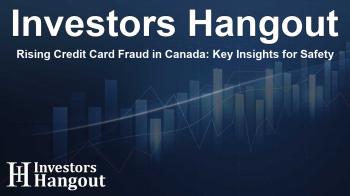Rising Credit Card Fraud in Canada: Key Insights for Safety

Understanding the Rise of Credit Card Fraud
In recent times, credit card fraud has become a pressing issue, particularly in Canada. The latest findings from Equifax Canada’s Market Pulse Fraud Trends and Insights Report shed considerable light on this concerning trend. As we delve into the statistics and expert opinions, it becomes evident that this problem is not merely a number on a report; it is a real threat to the finances and identities of Canadians.
Current Trends in Credit Card Fraud
The report indicates a worrying increase in credit card fraud rates, rising to 0.75 percent in the second quarter of 2025. This rise comes despite a decrease in overall application fraud, which dropped to 0.56 percent. Although this decline signifies a drop in consumer demand and stricter lending practices, it also conceals the alarming growth of credit card fraud. Fraud rates rose sharply from only 0.44 percent the previous year. This contradiction presents a troubling reality where fraudulent behaviors are shifting even as application fraud diminishes.
Who is Affected?
The demographics of those affected by credit card fraud are broadening. Today, fraudsters target a variety of consumers rather than focusing on specific groups. Middle-aged Canadians, in particular, are witnessing sharp increases in fraud, especially in regions previously noted for high delinquency rates. This draw towards a wider audience signals that identity fraud is becoming more challenging to combat.
The Mechanics Behind the Fraud
One of the critical takeaways from Equifax's report is that third-party fraud now constitutes an overwhelming 83 percent of all fraudulent activities in the credit card sector. Additionally, true-identity fraud represents 78 percent of these incidents. As fraudsters exploit existing vulnerabilities in credit assessment and identity verification, the financial landscape becomes increasingly perilous. This is a call for vigilance across all sectors
Fraud Patterns and Vulnerabilities
According to experts, fraud patterns are adapting rapidly to exploit weaknesses in verification processes. The rise in credit card fraud, when viewed alongside these patterns, underscores the need for enhanced security measures. Cherolle Prince, Director of Fraud Consulting at Equifax Canada, emphasizes the urgent need for improved identity verification and a collaborative approach across different industries to tackle this issue.
Understanding First-Party Fraud
A particular concern is the increase in first-party fraud, which has risen by 7 percent compared to the previous year. This type of fraud typically relates to individuals misrepresenting their financial circumstances to obtain credit. Surprisingly, while there are significant drops in third-party fraud across other sectors, identity theft continues to fuel most of the ongoing fraudulent activity.
Industry-Specific Fraud Rates
Beyond credit cards, various sectors report different fraud rates. For instance, auto fraud has seen a decline from 0.26 percent to 0.23 percent year-over-year, while banking and deposit fraud fell from 1.09 percent to 0.70 percent. Interestingly, non-mortgage holders face slightly higher fraud risks than mortgage holders, signifying that those looking to transition into homeownership need to be particularly cautious.
The Future of Fraud Prevention
As we approach the end of the year, seasonal trends suggest that fraud may surge. With the holiday season nearing, it's imperative for consumers to stay informed about protective measures against identity theft and fraud. Equifax advises Canadians to utilize educational resources focused on fraud prevention, enhancing their understanding and vigilance.
The Importance of Awareness
Awareness is a powerful tool in the fight against fraud. By remaining informed about the latest fraud tactics and investing in preventive measures, consumers can protect themselves and minimize their risks. Equifax’s guidance on identity theft emphasizes proactive steps, which can make a significant difference.
Conclusion: A Call to Action
With the alarming trends of credit card fraud becoming more apparent, it becomes essential for all stakeholders, including lenders, policymakers, and consumers, to collaborate and implement stringent measures. The risks are pervasive, affecting countless Canadians. By working together, we can foster a safer financial environment, minimizing the opportunities for fraudsters.
Frequently Asked Questions
What is the current rate of credit card fraud in Canada?
As of the second quarter of 2025, the rate of credit card fraud in Canada stands at 0.75 percent.
Who is primarily targeted by credit card fraudsters?
Fraudsters are increasingly targeting middle-aged Canadians across various regions, particularly in Ontario and Atlantic Canada.
What are the main types of fraud reported?
The report highlights a significant amount of third-party fraud, with true-identity fraud constituting a major portion of these cases.
How can consumers protect themselves against fraud?
Consumers are encouraged to educate themselves about fraud prevention strategies and take proactive measures to safeguard their identities.
What role does Equifax play in addressing fraud?
Equifax provides analytics and data solutions to financial institutions, helping them make informed decisions to combat fraud effectively.
About The Author
Contact Olivia Taylor privately here. Or send an email with ATTN: Olivia Taylor as the subject to contact@investorshangout.com.
About Investors Hangout
Investors Hangout is a leading online stock forum for financial discussion and learning, offering a wide range of free tools and resources. It draws in traders of all levels, who exchange market knowledge, investigate trading tactics, and keep an eye on industry developments in real time. Featuring financial articles, stock message boards, quotes, charts, company profiles, and live news updates. Through cooperative learning and a wealth of informational resources, it helps users from novices creating their first portfolios to experts honing their techniques. Join Investors Hangout today: https://investorshangout.com/
The content of this article is based on factual, publicly available information and does not represent legal, financial, or investment advice. Investors Hangout does not offer financial advice, and the author is not a licensed financial advisor. Consult a qualified advisor before making any financial or investment decisions based on this article. This article should not be considered advice to purchase, sell, or hold any securities or other investments. If any of the material provided here is inaccurate, please contact us for corrections.

